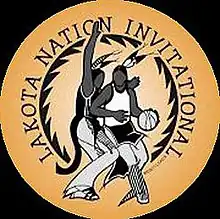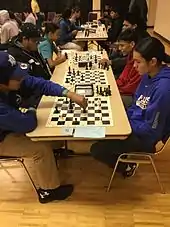Lakota Nation Invitational
The Lakota Nation Invitational is an annual multi-sport event tournament held each winter that began in 1976. The event takes place in the Rushmore Plaza Civic Center in Rapid City and hosts around 40 different schools from Indian Reservations in South Dakota, North Dakota, Nebraska and Wyoming.[1] The event has categories including basketball, traditional Lakota hand games, knowledge and language bowls, a student art show, a business plan competition, wrestling, volleyball, cross country, archery, golf and a chess tournament[2][3][4]
 | |
| Abbreviation | LNI |
|---|---|
| Formation | 1976 |
| Type | Volunteer; Non-profit organization |
| Legal status | Association |
| Purpose | Athletic/Educational |
Region served | South Dakota |
Membership | 41 member high schools |
Official language | Lakota, English |
Board President | Chuck Wilson |
Staff | 20 |
| Website | Lakota Nation Invitational |
History
In 1976, the inaugural Lakota Nation Invitational (LNI) was held at Pine Ridge High School. The basketball tournament developed out of tensions resulting from the American Indian Movement’s occupation of Wounded Knee in 1973.[5]
In 1973, Itancan Bryan Brewer was a basketball coach at Pine Ridge School. The American Indian Movement. wanted the U.S. government to honor the treaties, which, they believed, had been broken. The occupation, which included the site of the 1890 massacre, set off an intense dispute between A.I.M. supporters and a private paramilitary group funded by the existing tribal leadership, whom the A.I.M. had accused of corruption.[6] In the three years following the seventy-one-day occupation, stabbings, shootings, and beatings related to the conflict became common, and by 1975, the impoverished Pine Ridge Indian Reservation had the highest murder rate in the United States.[7][8][9]
Following American Indian Movement’s occupation, Athletic directors from school districts across South Dakota refused to let their athletes play basketball with students from Pine Ridge. Itancan Bryan Brewer decided to start a tournament of his own.[10][11]
Brewer contacted schools in other states to play in the tournament. Seven schools agreed to compete in the 1976 tournament, which packed the Pine Ridge gymnasium. Three years later, the tournament relocated to the recently constructed Rushmore Plaza Civic Center Arena in order to better accommodate large crowds of spectators.[12]
The tournament has seen significant growth and changes since its inception. Originally a gathering just for basketball games, the tournament now boasts a variety of events including traditional Lakota hand games, knowledge and language bowls, a student art show, a business plan competition and chess tournament.[13]
Events and coordinators

- Event Founder: Itancan Bryan Brewer
- Board President: Chuck Wilson
- Lakota Language Bowl Coordinators: Philomine Lakota and Peter Hill
- Announcers Coordinator: Tiny DeCory
- Ads/Sponsorships Coordinator: Tonya Whirlwind Soldier
- Basketball Coordinator: David Dolan
- Activities Coordinator: Karla Cuny
- Student Workshop Coordinator:Dayna Brave Eagle
- Archery Competition Coordinator: Mike One Star
- Knowledge Bowl Coordinator: Yamni Jack
- Handgames Coordinator: Roger White Eyes
- Cheer Competition Coordinator: Jenifer Gayton Bowman
- Poetry Slam Coordinator: Autumn White Eyes and Ptesan Win Little Whiteman
- Youth Business Plan Coordinator: Angela Koenan
- Art Show Coordinator: Michael Poland
- Wrestling Coordinator: Jennifer Shaer
- Chess Competition Coordinator: Mike Beardt
- E-Sports Competition: Yamni Jack
- Golf Competition Coordinator: R. Ben Bordeaux
References
- Collins, Thosh (January 3, 2017). "Water, Life and Basketball: The Lakota Nation Invitational (Photo Gallery)". Indian Country Media Network. Retrieved April 11, 2017.
- Ramsden, Brenna (December 20, 2016). "Lakota Nation Invitational brings economic boost to Rapid City". ABC: Kota territory News. Retrieved April 11, 2017.
- Giago, Tim (December 16, 2014). "The Olympics of Indian Basketball". Huffington Post. Retrieved April 11, 2017.
- Christensen, Lance (September 18, 2011). "Lakota Nation golf invitational features eight teams, one individual". Lakota Country Times News. Retrieved April 17, 2017.
- Wickersham, Justin (December 22, 2016). "Lakota Nation Invitational: Day 1 Scores and Highlights". Visit Newscenter 1 Network. Retrieved April 11, 2017.
- Anderson, Kelli (December 22, 2003). "Hoops Dream The LAKOTA NATION INVITATIONAL honors the sports passion and culture of American Indians". Sports Illustrated. Retrieved April 11, 2017.
- Will, Jesse (January 31, 2016). "A NATIVE AMERICAN BASKETBALL TOURNAMENT BOUNCES BACK". The New Yorker. Retrieved April 11, 2017.
- Tucker, Bruce (December 22, 2014). "Lakota Nation Invitational". South Dakota Magazine. Retrieved April 11, 2017.
- "Racial Tensions May Prompt a Move of Lakota Nation Invitational Tournament". New York Times. Associated Press. March 13, 2015. Retrieved April 11, 2017.
- Rogers, Rochelle (December 15, 2016). "IN HISTORY: 2016 Marks 40th Anniversary of Lakota Nation Invitational". Black Hills Knowledge Network. Retrieved April 11, 2017.
- Walking Eagle, Dani (December 14, 2016). "2016 Lakota Nation Invitational Basketball Tournament". Visit Rapid City News. Retrieved April 11, 2017.
- O'Connell, Max (December 14, 2016). "Lakota Nation Invitational began from racist fears". Rapid City Journal. Retrieved April 11, 2017.
- Crash, Tom (December 22, 2016). "Todd County claims LNI wrestling championship, Standing Rock's Lester takes 152 division, outstanding wrestler award". Lakota Country Times News Network. Retrieved April 11, 2017.
- Close, Kiri (December 12, 2016). "Lakota Nation Invitational Board and Staff". The Lakota Nation Invitational. Retrieved April 11, 2017.
- Gallagher, Lisa (December 12, 2016). "40th Anniversary of the Lakota Nation Invitational". The Sioux Empire. Retrieved April 11, 2017.